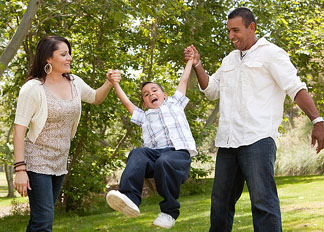Recently, results were released from a new survey which polled more than 1,200 married moms about their parenting habits, focusing especially on how they share responsibilities with their spouses. The headline was an attention-grabber: “… Working and Stay-at-Home Mothers Feel Like ‘Married Single Moms.'”
Only about 1 in 4 moms agreed with that statement, but some other findings are worth our attention: 92% of working moms and 89% of stay-at-home moms feel overwhelmed by work, home and parenting responsibilities; 70% (working) and 68% (at-home) of moms feel resentful toward their partner because of the unbalanced load of household and parenting responsibilities; and among stay-at-home moms, 84% don’t get a break from parenting after their partner walks in the door at night, and 50% say they never receive a time-out from parenting. More on the survey.
This survey has drawn criticism for several reasons: It overlooks — or at least undervalues — a dad’s contributions as a worker, since the main purpose of his job is to provide for his family. It may also diminish the role of a stay-at-home parent, which many moms and dads consider a privilege and an investment that’s worth some sacrifice. Additionally, there may be reason to consider the survey unreliable since the women who would take time to respond are likely already discontent in their work/home situation.

Dads may feel offended, taken for granted or even convicted when they hear that some women feel like “married single moms.” Whether or not these survey results are accurate for your household, they do provide a good opportunity to take a hard look at how well you’re working as a team with your wife and whether you’re doing your fair share.
What’s your fair share of the load when it comes to parenting and household duties? What does she expect of you, and are those expectations realistic? These are important questions for each couple to answer, and that’s a key first step: to talk about the issue and see if some changes are in order. Communication is key.
Then, you need to commit to that plan going forward, so you’re accountable. Some dads never say what they intend to do, so they can’t get in trouble for not doing it! Those dads sometimes come off as playmates only — caring for the kids when they feel like it or when they have extra time. What’s more, whenever they do contribute as a father, they might act like they deserve an award for making sacrifices above and beyond the call of duty. After all, anything looks great when they’ve committed to nothing.
Dad, have this discussion with your child’s mother and, if necessary, agree on some ways you can help out more. Maybe you’ll be in charge of bath night, supervising Saturday chores, and tucking in time. Work out the details, then verbalize your commitment to the plan. (And revisit the plan in another month, to see if it needs to be updated.)
ACTION POINTS for Dads on the Journey
- Ask your child’s mom, “Do you feel overwhelmed?” If so, ask, “How can I help?”
- Make it a priority to add at least one household or parenting task to your regular routine. Add it to your calendar as a reminder.
- Talk with your child’s mother about her expectations of you as a dad. Get specific! Talk about diaper changes, the amount of time spent with the kids, what part you play when it comes to discipline.
- Help your child’s mom make arrangements for an afternoon, a day or a weekend to get away on her own, with no childcare responsibilities.
- Make it part of the regular routine in your marriage to check in about day-to-day details, joys, and frustrations.

